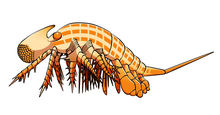Goticaris is a genus of small (1 mm (0.039 in) long) extinct Cambrian arthropods, known from the Orsten lagerstätten in southern Sweden. It appears to have several apomorphic features, notably including a single large compound eye.[1]
| Goticaris Temporal range:
| |
|---|---|

| |
| Scientific classification | |
| Domain: | Eukaryota |
| Kingdom: | Animalia |
| Phylum: | Arthropoda |
| Family: | †Cambropachycopidae |
| Genus: | †Goticaris Walossek & Müller, 1990 |
| Species: | †G. longispinosa
|
| Binomial name | |
| †Goticaris longispinosa Walossek & Müller, 1990
| |
The head of Goticaris has an unusual anterior projection of the head that bears a single large and what are possibly two smaller stalked compound eyes. There are four pairs of appendages on its head. The first pair of appendages are treated as antennae, and the other appendages on head are biramous. The mouth opens on the ventral surface in front of the second pair of appendages.[1] The abdomen has four segments with four pairs of paddle-shaped appendages, and a telson.[1]
Ecology
editAccording to its close relative Cambropachycope's eye structure, Goticaris was probably a predator.
Classification
editIt is hesitantly presumed to be an early offshoot under the clade Pancrustacea in original description. It consists of the species Goticaris longispinosa. Other organisms, including Henningsmoenicaris and Martinssonia also discovered in Orsten, may exist at a similar place on the phylogenetic tree. Collectively, this may have implications for the origins of the crustaceans.[1] However, later study placed this genus outside Pancrustacea, and just treated as stem-group Mandibulata.[2]
See also
editReferences
edit- ^ a b c d Waloszek, Dieter; Müller, Klaus (1990-10-01). "Upper Cambrian stem-lineage crustaceans and their bearing upon the monophyly of Crustacea and the position of Agnostus". Lethaia. 23: 409–427. doi:10.1111/j.1502-3931.1990.tb01373.x.
- ^ Edgecombe, Gregory D. (2017-09-01). "Inferring Arthropod Phylogeny: Fossils and their Interaction with Other Data Sources". Integrative and Comparative Biology. 57 (3): 467–476. doi:10.1093/icb/icx061. ISSN 1540-7063. PMID 28957518.